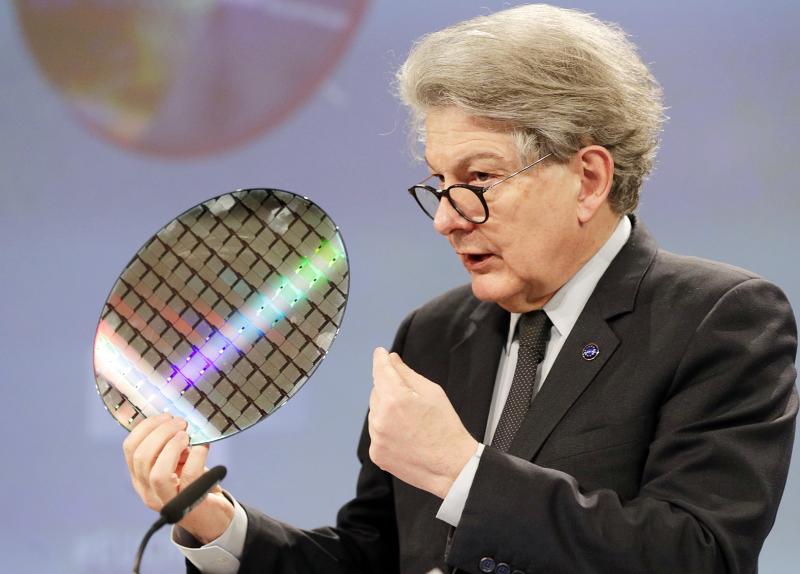Taiwan yesterday welcomed an act proposed by the EU that aims to enable the bloc to work more closely with global leaders in the semiconductor industry, such as Taiwan.
On Tuesday, the European Commission unveiled the proposed European chips act, which neutralizes strict rules governing state aid to encourage companies such as Intel Corp and Taiwan Semiconductor Manufacturing Co (TSMC, 台積電), the world’s largest contract chipmaker, to build more microprocessors in the region.
Under the act, the commission plans to allocate 11 billion euros (US$12.58 billion) in public funds for the research, design and manufacture of semiconductors, with the goal of mobilizing a total of 43 billion euros of public and private investment until 2030 to expand the EU’s global market share of semiconductors from its current 9 percent to 20 percent.

Photo: EPA-EFE
Ministry of Foreign Affairs spokeswoman Joanne Ou (歐江安) yesterday expressed the government’s receptiveness toward the proposal, which could enhance Taiwan-EU cooperation in bilateral investment and trade.
The ministry believes there is tremendous room for cooperation between Taiwan and the EU in the semiconductor industry, reconstructing the global supply chain and bolstering democratic resilience in the post-COVID-19 era, Ou said.
Taiwan is ready to explore innovative measures to continue to deepen collaboration with the EU and its member states, based on existing communication channels, she added.
As stated in the act, only two companies in the world, one being TSMC, are capable of manufacturing the most advanced semiconductors.
“As a first step, the above will be explored — using existing or new fora — with like-minded partners, such as the United States, Japan, South Korea, Singapore, Taiwan and others,” the act says.
At a press event to unveil the act on Tuesday, European Commissioner for Competition Margrethe Vestager and European Commissioner for Internal Market Thierry Breton lauded Taiwan’s leading position in the semiconductor industry, while reiterating the EU’s offer to TSMC to invest in Europe.

The Central Election Commission has amended election and recall regulations to require elected office candidates to provide proof that they have no Chinese citizenship, a Cabinet report said. The commission on Oct. 29 last year revised the Measures for the Permission of Family-based Residence, Long-term Residence and Settlement of People from the Mainland Area in the Taiwan Area (大陸地區人民在台灣地區依親居留長期居留或定居許可辦法), the Executive Yuan said in a report it submitted to the legislature for review. The revision requires Chinese citizens applying for permanent residency to submit notarial documents showing that they have lost their Chinese household record and have renounced — or have never

A magnitude 5.6 earthquake struck off the coast of Yilan County at 12:37pm today, with clear shaking felt across much of northern Taiwan. There were no immediate reports of damage. The epicenter of the quake was 16.9km east-southeast of Yilan County Hall offshore at a depth of 66.8km, Central Weather Administration (CWA) data showed. The maximum intensity registered at a 4 in Yilan County’s Nanao Township (南澳) on Taiwan’s seven-tier scale. Other parts of Yilan, as well as certain areas of Hualien County, Taipei, New Taipei City, Taoyuan, Hsinchu County, Taichung and Miaoli County, recorded intensities of 3. Residents of Yilan County and Taipei received

Taiwan has secured another breakthrough in fruit exports, with jujubes, dragon fruit and lychees approved for shipment to the EU, the Ministry of Agriculture said yesterday. The Animal and Plant Health Inspection Agency on Thursday received formal notification of the approval from the EU, the ministry said, adding that the decision was expected to expand Taiwanese fruit producers’ access to high-end European markets. Taiwan exported 126 tonnes of lychees last year, valued at US$1.48 million, with Japan accounting for 102 tonnes. Other export destinations included New Zealand, Hong Kong, the US and Australia, ministry data showed. Jujube exports totaled 103 tonnes, valued at

BIG SPENDERS: Foreign investors bought the most Taiwan equities since 2005, signaling confidence that an AI boom would continue to benefit chipmakers Taiwan Semiconductor Manufacturing Co’s (TSMC, 台積電) market capitalization swelled to US$2 trillion for the first time following a 4.25 percent rally in its American depositary receipts (ADR) overnight, putting the world’s biggest contract chipmaker sixth on the list of the world’s biggest companies by market capitalization, just behind Amazon.com Inc. The site CompaniesMarketcap.com ranked TSMC ahead of Saudi Aramco and Meta Platforms Inc. The Taiwanese company’s ADRs on Tuesday surged to US$385.75 on the New York Stock Exchange, as strong demand for artificial intelligence (AI) applications led to chip supply constraints and boost revenue growth to record-breaking levels. Each TSMC ADR represents